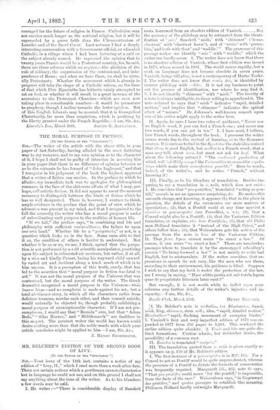MR. BELCHER'S EDITION OF THE SECOND BOOK OF LIVY.
LTO THE EDITOR OF THE "SPECTATOR."]
Sra,—Your issue of the 11th inst. contains a notice of my edition of "Lim II.," which I read more than a week after date. There are certain actions which a gentleman cannot characterise but in language he could not use, and on this ground I shall not say anything about the tone of. the writer. As to his blunders, a few words may be said.
I. He writes There is considerable display of Sanskrit roots, borrowed from an obsolete edition of Vanicek But the accuracy of the philology may be estimated from the identi-
fication of 'asic,' Sanskrit mish,' with 'shimmer' (' horse- chestnut' with 'chestnut horse'), and of venio' with preter-
bito,' and both with 'foot' and 'waddle.'" The grammar of this passage makes me identify " mic " with " waddle," which the writer can hardly mean. 1. The writer does not know that there is no obsolete edition of Vanicek, whose first edition was issued in 1874, whose second in 1881. The world moves rapidly, but a work on language does not become obsolete in seven years.
Vanicek, being still alive, is not a contemporary of Horne Tooke.
2. The writer does not know that venio, &c., is identified by current philology with —Silo. It is not my business to point
out the process of identification, nor where he may find it.
3. I do not identify " shimmer " with "mish." The brevity of a note is always intelligible, to those willing to apprehend it. The note referred to says that " mish" indicates "rapid, detailed motion," and implies that " shimmer " indicates the optical effect of " rnieare." Dr. Johnson's well-known remark upon one of his critics might apply to the writer here.
IL Again, he says I have two rules of guidance, "Never use an English word, if you can find a French one ; and never use two words, if you can get in ten." 1. I have used, I believe, four French words, throughout the book. I presume the writer means words due to the revival of learning, or to the Romance
sources. It is curious to find in the Spectator the stale idea revived that sheep is good English, but mutton is a French word ; that a man may talk about oxen, but must not ask for beef. What about the following extract ? "The continued production of which will hffallibty compel the Universities to reconsider regula- tions which make their manufacture possible." Here be words, indeed, of the writer's ; and he writes "French," without knowing it !
III. Finally, as to his blunders of translation. Besides im- puting to me a translation in c. xviii. which does not exist : I. He considers that "pro pontifice," translated "acting as pon- tiff," reveals in me an ignorance surprising, &c. He makes this uncouth charge, not knowing, it appears (1), that in the place in question, the details of the ceremonies are mere matters of
speculation ; (2), that a Pontiff could at any time appoint a vicarins or pro-magister (see Forcellini, s. v.) ; (3), that a
Consul might also be a Pontiff; (4), that the Variorum Edition
translates, or explains, vice loco Pontificis ; (5), that old Phile- mon Holland translates it "instead of the High Priest," and
others follow him ; (6), that Weissenborn gets his notion of the
passage from the note in loco of the Variorum Edition.
II. That ferre legem cannot mean "to enact a law." Of
course, it can mean "to enact a law." There are numberless passages where to translate it by the stereotyped schoolboy's version "To bring forward a law" is not merely to write bad English, but to mistranslate. If the writer considers that ex- pressions in speech do not vary, like the men who use them, according to their environment, his guidance is blind. Suppose I wish to say that my book is under the protection of the law, am I wrong in saying, " Haec editio posita est sub tutelalegum quae de proprietate litteraria latae aunt ?"
But enough ; it is not worth while to inflict upon your columns any further details of the writer's injustice and in- capatity.—I am, Sir, &c.,
[I. Mr. Belcher's note is verbatim, (a) Dimicantes, Sansk. mish, Eng. shimmer, stem mik ; idea," rapid, detailed motion."
Dimicatio=" rapid, flashing movement of sweeping blades."
1. Vanicek's first and very imperfect edition of 1874 was ex- panded in 1877 from 256 pages to 1,294. This rendered the
earlier edition quite obsolete. 2. Venio and 1,i to are quite dis- tinct formations. Curtius admits, but Schleicher denies, the possibility of a CoI11111011 root.
II. Exsules is translated " enzigrtcs."
III. The translation quoted from c. xviii. is given exactly as it appears on p. 130 of Mr. Belcher's edition.
I. The first instance of a 2wo-magistpr is in B.C. 155. For a Consul to act as Pontiff would be quite unprecedented, whereas the presence of a Pontiff to dictate the formula of consecration was frequently required. Marquardt (iii., 262, note 6) says, "That pro pontifice could mean for the pontiff,' is impossible, from the facts of the case." Weissenborn says, "in Gegenwart des pontifex," and quotes passages to establish this meaning. Philemon Holland hardly outweighs Marquardt. II. The confusion of ferro legem and peiferre legem is sanc- tioned by no good authorities.
Mr. Belcher offers no defence in relation to the greater number of the errors criticised.—En. Spectator.]















































 Previous page
Previous page